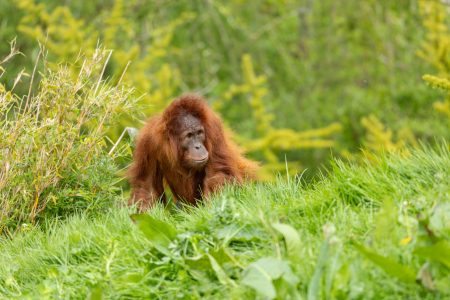The Rimba Raya Biodiversity Reserve Project is a large-scale conservation initiative aimed at reducing deforestation in Indonesia by preserving 91,215 hectares of tropical peat swamp forest. Without the project, this land would have been converted into palm oil plantations, releasing millions of tons of carbon dioxide into the atmosphere and causing irreversible habitat loss for endangered species, including the Bornean orangutan.
The project prevents the clearing, burning, and draining of peatlands, which are among the world’s most significant carbon sinks. By maintaining the natural ecosystem, it helps mitigate climate change while providing essential services such as water purification and flood prevention. Additionally, the initiative establishes a protective buffer around the Tanjung Puting National Park, ensuring the continued survival of its diverse wildlife.
Through carbon credit revenues, the project funds local community programs, including sustainable employment opportunities, healthcare initiatives, education, and clean water access. This integrated approach not only protects the environment but also fosters economic resilience for the region’s inhabitants.
VCS674
Registered
Central Kalimantan, Borneo, Indonesia

REDD+ (Reducing Emissions from Deforestation and Degradation)
3,527,171 tCO₂e

July 1, 2009 – June 30, 2039
Preservation of carbon-rich peat swamp forests, biodiversity conservation, and sustainable livelihoods for local communities
The project has a strong commitment to environmental and sustainable development that benefit local communities through the following contributions:
Environment
By preventing deforestation and degradation, the project avoids the release of 3,527,171 tCO₂e annually. It protects peat swamp forests, which are critical carbon sinks, and prevents emissions from land clearing, drainage, and peat fires. The conservation area supports 47,237 hectares of protected land, ensuring the long-term storage of carbon and the preservation of unique biodiversity, including 54 species listed as critically endangered or endangered by the IUCN.
Community
The project provides essential services to local communities by improving access to clean water, renewable energy, and healthcare. More than 2,000 households benefit from water filtration systems, reducing waterborne diseases. The project has also installed solar power systems, providing energy to villages that previously lacked electricity. Additionally, it funds floating clinics that deliver medical care to remote areas.
Employment
The initiative has created sustainable jobs in forest conservation, patrol monitoring, and community-based enterprises. Over 73 people are employed directly by the project, with wages significantly above the national poverty line. Seasonal employment opportunities in reforestation, community development, and agroforestry further support local economic stability.
Biodiversity Protection
By maintaining intact peat swamp forests, the project ensures the survival of critically endangered species such as the Bornean orangutan, proboscis monkey, and numerous bird species. It supports habitat restoration through reforestation efforts, including the planting of over 504 hectares of peat swamp forest. Additionally, the project collaborates with Orangutan Foundation International to rehabilitate and release rescued orangutans into protected habitats.
By preventing deforestation and offering sustainable alternatives to local communities, the Rimba Raya project demonstrates the viability of conservation-based economies. This initiative follows the Verra Verified Carbon Standard (VCS), ensuring measurable and verifiable emissions reductions while contributing to global climate goals.

Verification: This project is verified by the Verified Carbon Standard.



SDG 1: No poverty

SDG 4: Quality Education

SDG 7: Affordable and clean energy

SDG 10: Reduced Inequalities

SDG 13: Climate action

SDG 16: Peace, justice and strong institutions

SDG 2: Zero Hunger

SDG 5: Gender equality

SDG 8: Decent work and economic growth

SDG 11: Susutainable cities and communities

SDG 14: Life below water

SDG 17: Partnerships for the goals

SDG 3: Good health and well-being for people

SDG 6: Clean water and sanitation

SDG 9: Industry, innovation and infrastructure

SDG 12: Responsible consumption and production

SDG 15: Life on land
One Tribe enables businesses to be more sustainable by funding rainforest protection projects that store carbon from being released into the atmosphere. By enabling customers to protect rainforest when they shop online we also empowers consumers to drive positive change
One Tribe is a Climate Action Platform enabling businesses and their customers to make a positive environmental impact.



Eric currently works as an independent consultant at the intersection of nature and climate, focused on catalysing market and non-market solutions to drive the just transition.
He previously was Head of Product at Earthshot Labs, supporting nature conservation and restoration projects across the global south secure project finance. Prior to Earthshot Labs, Eric led nature-based carbon project development for Gorongosa National Park in Mozambique and founded the Carbon Cooperative, a global alliance of leading nature conservation and restoration practitioners exploring carbon finance. After serving in the Peace Corps in Mozambique out of university, he spent much of his 20s working in community-based conservation and ecosystem restoration efforts in Sub-Saharan Africa interspersed with two startup ventures as co-founder and CEO of a mental health tech startup and COO of a sustainable coffee company. Eric has a dual Masters in Environmental Engineering and Environmental Policy from Stanford University where he was a NSF Graduate Research Fellow and a BS in Environmental Engineering from Tufts University.
Alan is a risk management thought-leader, superconnector, and FinTech pioneer. His mission is to enable an Earth Positive economy which includes nature in global accounting systems.
Alan is Founder of Generation Blue, a venture studio dedicated to planetary game changers powered by exponential technologies. Previously, Alan established Natural Capital Markets at Lykke AG, pioneering blockchain based forestry and carbon backed tokens. Alan has over two decades of risk management experience advising global financial institutions, and was a founding member of the RiskMetrics Group, a JPMorgan spin-off. Alan is an investor and advisor to regenerative impact ventures, including TreeBuddy.Earth, Regenativ, and Vlinder Climate.
Lori Whitecalf made history when she became the first woman to be elected Chief of Sweetgrass First Nation in 2011. She served three terms of office from 2011-2017.
Lori took a two-year hiatus from leadership to expand the family ranch and serve as the FSIN Senior Industry Liaison. She was re-elected on November 29. 2019 and again on November 30, 2021, as Chief of Sweetgrass. Chief Whitecalf practises a traditional lifestyle of hunting, fishing and gathering. She currently sits on the following boards: Saskatchewan Indian Institute of Technology, FSIN Lands and Resource Commission, Battle River Treaty 6 Health Centre and Battleford Agency Tribal Chiefs Executive Council, FSIN Women’s Commission.
Tina is the Chief Business Officer for MLTC Industrial Investments, the Economic Development arm of the Meadow Lake Tribal Council. She has a diverse background of experience. Having spent 15 years as a municipal Chief Operating Officer, 20 years involved in Saskatchewan’s Health Authority Board Keewatin Yatthe and 9 years with Northern Lights Board of Education.
She continues as a Board Member with Beaver River Community Futures supporting small business development in her home region. Tina brings a wealth of experience in a variety of fields and many connections to the Indigenous communities of Northern Saskatchewan. In addition Tina holds a BA Advanced from the U of S, a Certificate in Local Government Authority from the U of R and is certified as a Professional Economic Developer for Saskatchewan and a certified Technician Aboriginal Economic Developer (TAED).
Tootoosis’ career spans 40+ years in HRM, political leadership, and Indigenous economic development, as a dedicated bridge builder and advocate for Indigenous causes.
As a key member of the Saskatoon Regional Economic Development Authority (SREDA) team since 2021, he develops strategies for the Truth and Reconciliation Commission final report and Call to Action #92.
He is a graduate of the First Nations University of Canada and a certified Professional Aboriginal Economic Developer. Spearheading various community initiatives while serving as a Chair of the SIEDN while directing ILDII and WIBF. Founder of MGT Consulting Tootoosis is based in Saskatoon, Treaty Six Territory.
Cy Standing (Wakanya Najin in Dakota) has a long and distinguished career including serving overseas as an Electronics Technician in the Royal Canadian Air Force, former Chief of Wahpeton Dakota Nation, former Vice Chief of the Federation of Saskatchewan Indigenous Nations (FSIN), past Executive Director of Community Development Branch of the Department of Northern Saskatchewan as well as an Order in Council appointment to the Federal Parole Board.
Mr. Standing has served as a Director on many Profit and Non-Profit Corporate Boards, including serving as a Director for Affinity Credit Union with assets of over six billion dollars as well as IMI Brokerage and Wanuskewin and is currently a member of the One Tribe Indigenous Carbon Board.